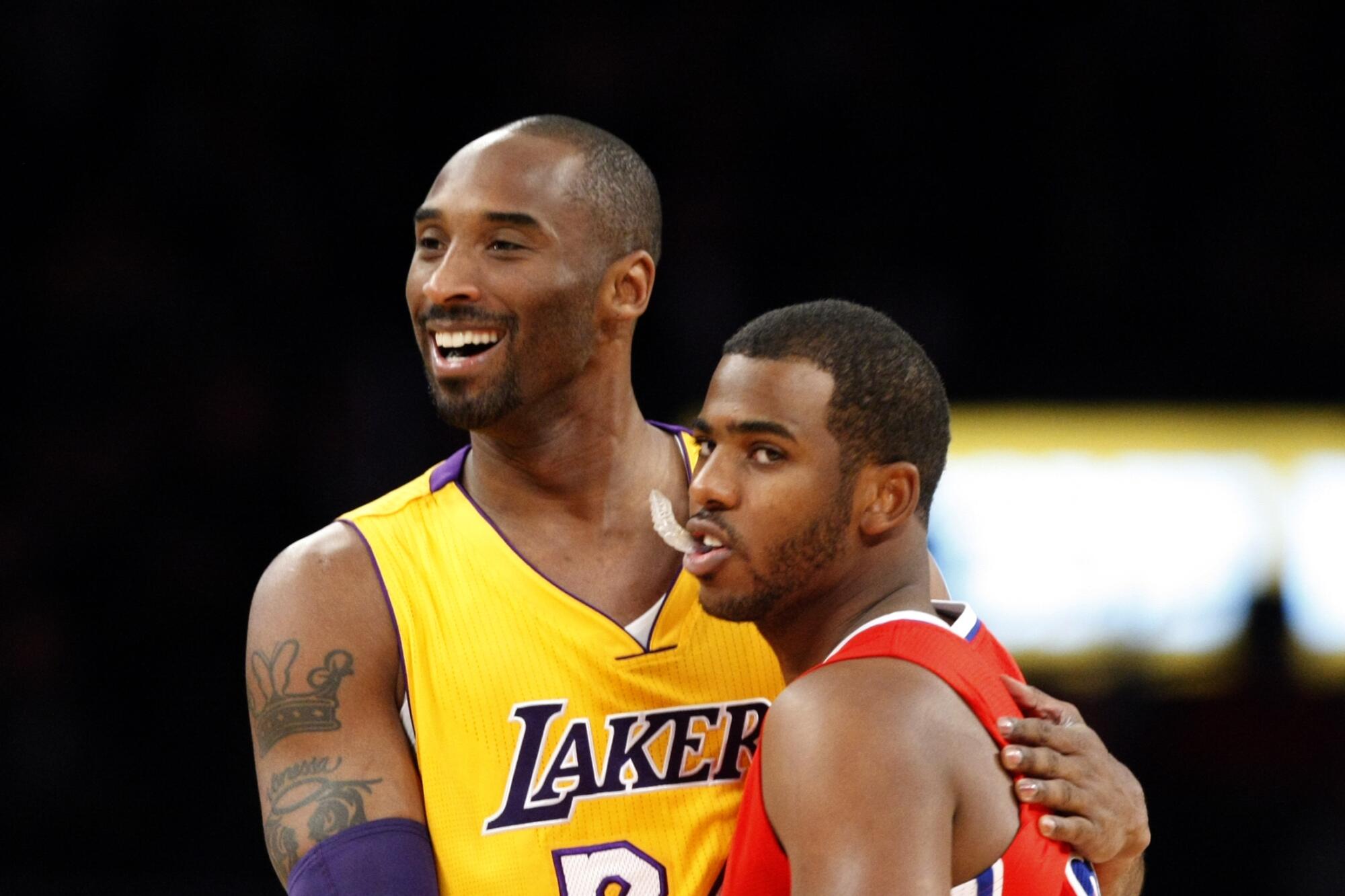
- Share via
By the afternoon of Dec. 8, 2011, the NBA was just emerging from a 161-day lockout, with months of negotiations between team owners and players producing a ratified, 10-year collective bargaining agreement.
In hindsight, it wasn’t even the most contentious deal discussed that day.
Acting in its role as the interim owner of the New Orleans Hornets, the NBA that night did not allow a three-team trade the Hornets had constructed that would have sent Chris Paul, the seventh-year All-Star already considered one of the game’s greatest point guards, to a Lakers franchise that had won two of the previous three titles. The vetoed trade set off a six-day span that changed the trajectories of the Lakers and the Clippers — one L.A. team that believed it had acquired Paul, and the other that ultimately landed him.
Ten years later, the moment remains a controversial, intertwined chapter in the histories of both L.A. franchises and the league — one not everyone cares to revisit.
Then-New Orleans general manager Dell Demps, former Clippers coach Vinny Del Negro and Paul, through the Phoenix Suns, declined to be interviewed. More than a dozen people interviewed who lived through those fraught six days remember it as former Hornets guard Jarrett Jack.
“It was,” he said, “a roller coaster.”
Part One, A Done Deal Undone: “The press release was completely ready to go”
In 2010, as Paul was believed to be looking for a way out of New Orleans, then-Lakers coach Phil Jackson questioned how the NBA would handle a trade for Paul in its authority as the team’s de facto owner. “Somebody’s going to have to make a very non-judgmental decision on that part that’s not going to irritate anybody else in this league,” Jackson said. “I don’t know how they’re going to do that.”
That moment of truth arrived as the lockout ended, when Paul signaled that he would not re-sign with New Orleans as a free agent following the 2011-12 season. Not wanting to lose Paul without something in return, the Hornets began searching for trade options.
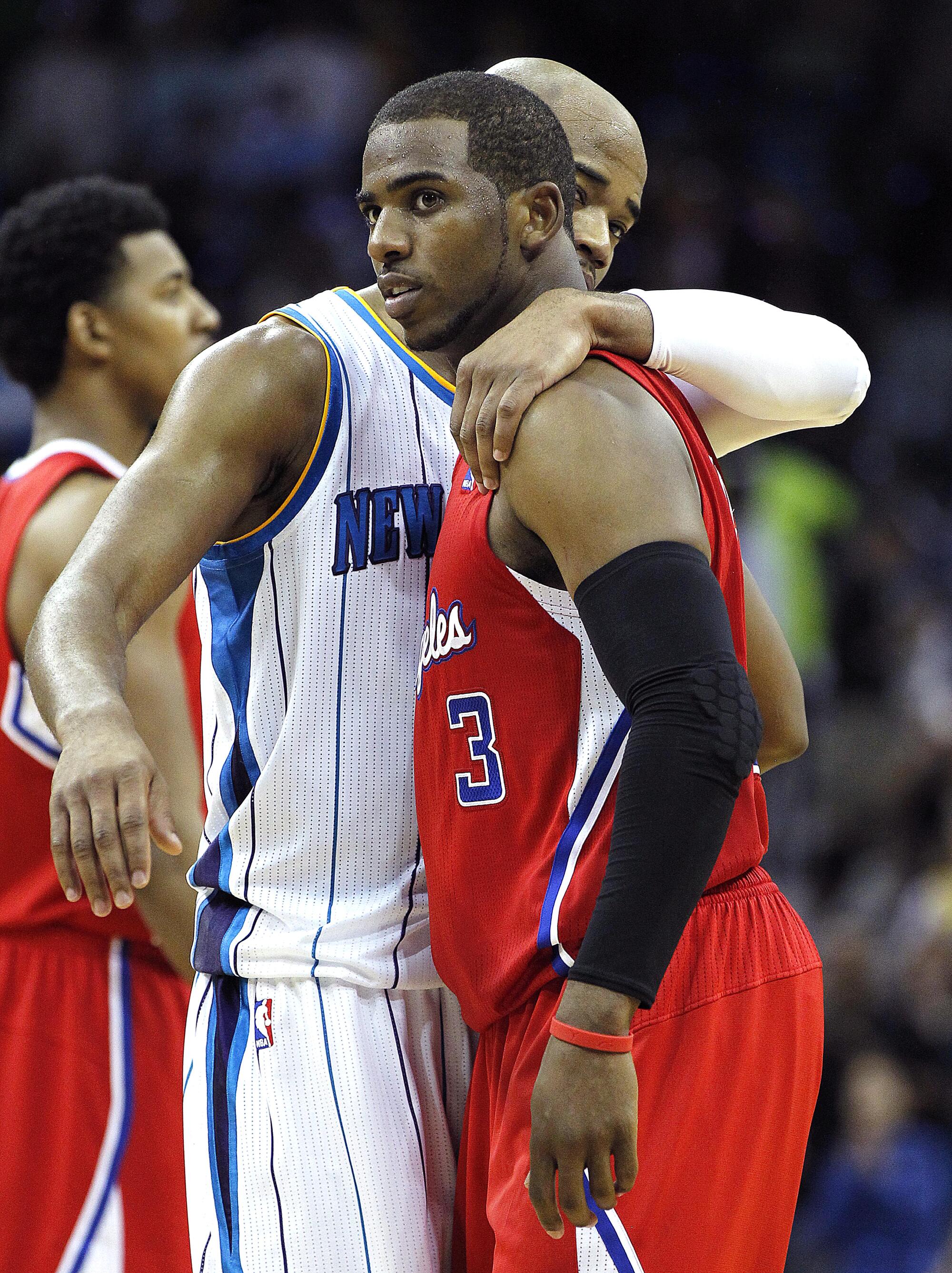
Jarrett Jack, Hornets guard 2010-12: “Me and Chris go back probably to like 12 years old. … So when I got traded [to New Orleans], I was looking for a place and Chris is like, ‘Nah, man just come stay at my house.’ So I stayed there while I’m doing this scavenger hunt and trying to find a place and then in the midst of all that the trade happened. So now, I’m actually sitting with him while this was going on.
“His wife is taping up boxes. He’s kind of like, packing up everything before my very eyes. Mind you, I’m looking at the TV. And it’s like breaking news, breaking news, Chris Paul to the Lakers.”
The deal on the television read that Paul would become a Laker, forming a star-laden backcourt with Kobe Bryant. The Rockets would receive Lakers forward Pau Gasol. The Hornets would get veteran forwards Lamar Odom and Luis Scola, young guards Kevin Martin and Goran Dragic and a 2012 first-round draft pick.
Odom, who won sixth man of the year with the Lakers the previous season, was especially stung.
Odom: “Even though I know the business and I understand the business of the league, I thought that because I had that strong year and accepted my role as a sixth man, I did think that they would never trade me.
“No disrespect to [New Orleans] or the organization but I never wanted to go down there. It’s just something I didn’t want to be part of.”
Stu Jackson, then-NBA executive vice president of basketball operations: “As part of our role as owners, interim owners, the objective was to both attract a potential buyer for the franchise, and then ultimately sell the franchise to someone. But before that actually happened, the team obviously was up and running, they had a general manager and they continued to work and conduct business as they normally would.
“We were both the owners of a franchise but we also had the dual role of approving all trades. So it was a bit of a conundrum.”
Cleveland Cavaliers owner Dan Gilbert, in a December 2011 email to David Stern: “I just don’t see how we can allow this trade to happen. I know the vast majority of owners feel the same way that I do. When will we just change the name of 25 of the 30 teams to the Washington Generals?”
Jackson: [Stern] “ran things by me, as an ex-general manager at the time. I explained to David the following … I felt that the package of Odom, Martin, Scola, Dragic was going to vault the New Orleans Hornets to a position where they’d make the playoffs but they were going to be a playoff team that was not capable of winning a championship.
“In other words, I thought so much of Monty Williams, I thought he would coach them up and get in the playoffs, not have home-court advantage and fans would be happy, obviously, but they would be caught in mediocrity and a mediocre team is not necessarily attractive to a potential owner. They want lesser payroll, they want to put their stamp on the team and build it and by making this trade, to me it made the franchise unattractive, or less attractive, to a potential owner. And to my surprise after another day David kind of got his head wrapped around it and he agreed. He made the decision to veto the trade and not approve.”
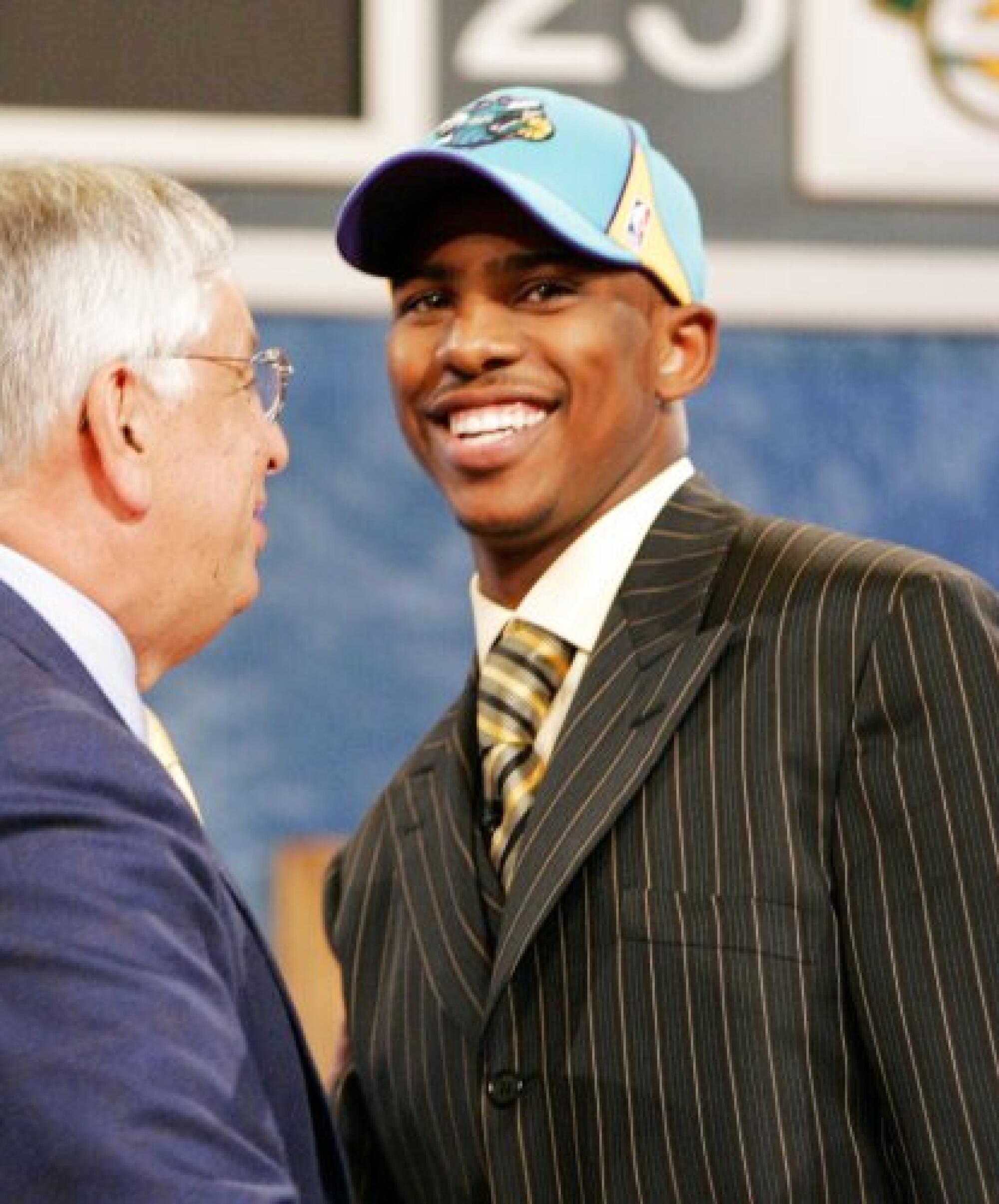
Paul, on the Knuckleheads podcast in 2020: “I was on the phone with my brother and my agent and all that. We figuring out a plane to get to New Orleans to get us to L.A. My agent clicked over, said ‘Hold on,’ clicked over and then he came back on and he was like, stuttering. And we was hot. We was hot. Me and Kobe had talked, you know what I’m saying?”
Jack about Paul: “He sits down and then he puts the phone on speakerphone. I can hear the conversation just because it’s on speakerphone, but I’m not like paying attention to it. But I hear somebody say ‘Yeah, we’re sorry to tell you this, but yeah we expect Chris at practice. And this is what’s going to happen until something else changes but we’ll see you tomorrow for practice.’
“And I can tell that the person on the phone, the voice was distinct, it was our GM. And the other voice on the phone I believe was the late David Stern. So then CP hangs the phone up. He’s like, ‘Yo, did you hear that?’ I’m like what’s going on? He’s like, ‘They just rescinded it.’”
Jackson: [Vetoed trades] “happen fairly often but usually it’s due to a technicality in the trade. Something’s off, the money’s off, the cap number’s off, medical records have passed or there’s been some impropriety in terms of disclosure, right, and they’ll veto the trade; it happens. But in this case, it’s a perfectly good three-way trade. But because the league was the owner of the Hornets, it just begged a lot of questions and wonderment why and how the league can be in a position and do that. I think people viewed it as a conflict.”
Mitch Kupchak, then-Lakers general manager, in 2011: “We did the best we can to express our displeasure.”
Stern to Sports Illustrated in 2018: “There was a trade that Dell Demps wanted us to approve and I said ‘Heck no,’ but he had told [then-Rockets general manager] Daryl Morey and Mitch Kupchak he had authority to do it and he didn’t. I said no. We just settled a lockout and you want me to approve a basketball trade?
“… He had agreed to Kevin Martin and Luis Scola or something, and I said we can do better than that.”
Jackson: “David made some comment that the reason he vetoed the trade was because it wasn’t an attractive enough package for a player of Chris Paul’s caliber. That was only a half-truth. The other part was that he also felt that he wanted the Hornets to be an attractive property to a prospective owner.”
John Black, former Lakers vice president of public relations: “I don’t remember another example of a trade press release being written, ever, until [trades] were done. This was done. I was told this was a done deal. The press release was completely ready to go. Luckily we didn’t send it.”
In Los Angeles, the Lakers scrambled for a follow-up plan: attempt to revive a deal for Paul, or move on? For players who learned they were on the verge of being traded, the damage was done. Odom said he considers himself a “Laker for life,” but in 2011, he struggled to manage his emotions as training camps opened. The Lakers traded him to Dallas on Dec. 11, effectively breaking up the pieces needed to acquire Paul and exiting the point guard’s sweepstakes. Odom retired two years later.
Odom: “I was just maybe a little hurt and disappointed. I thought I would retire, honestly.
“One of my closest cousins was just killed in the Bronx and at that point in my life I just felt like, everything that was happening in my life I couldn’t help, along with his death. It was just probably a little bit mentally too much for me to recover.”
Willie Green, New Orleans guard in 2010-11 and friend of Paul: “It was an awkward moment for all the folks in New Orleans because Chris was still coming to practice while that was happening but they wouldn’t let him practice with the team. He just was in there, shooting. I was talking to a couple people about it and they said they had never seen anything like this before where a guy got traded, it got publicized and then it’s nixed and you’re still with the team. It was weird.”
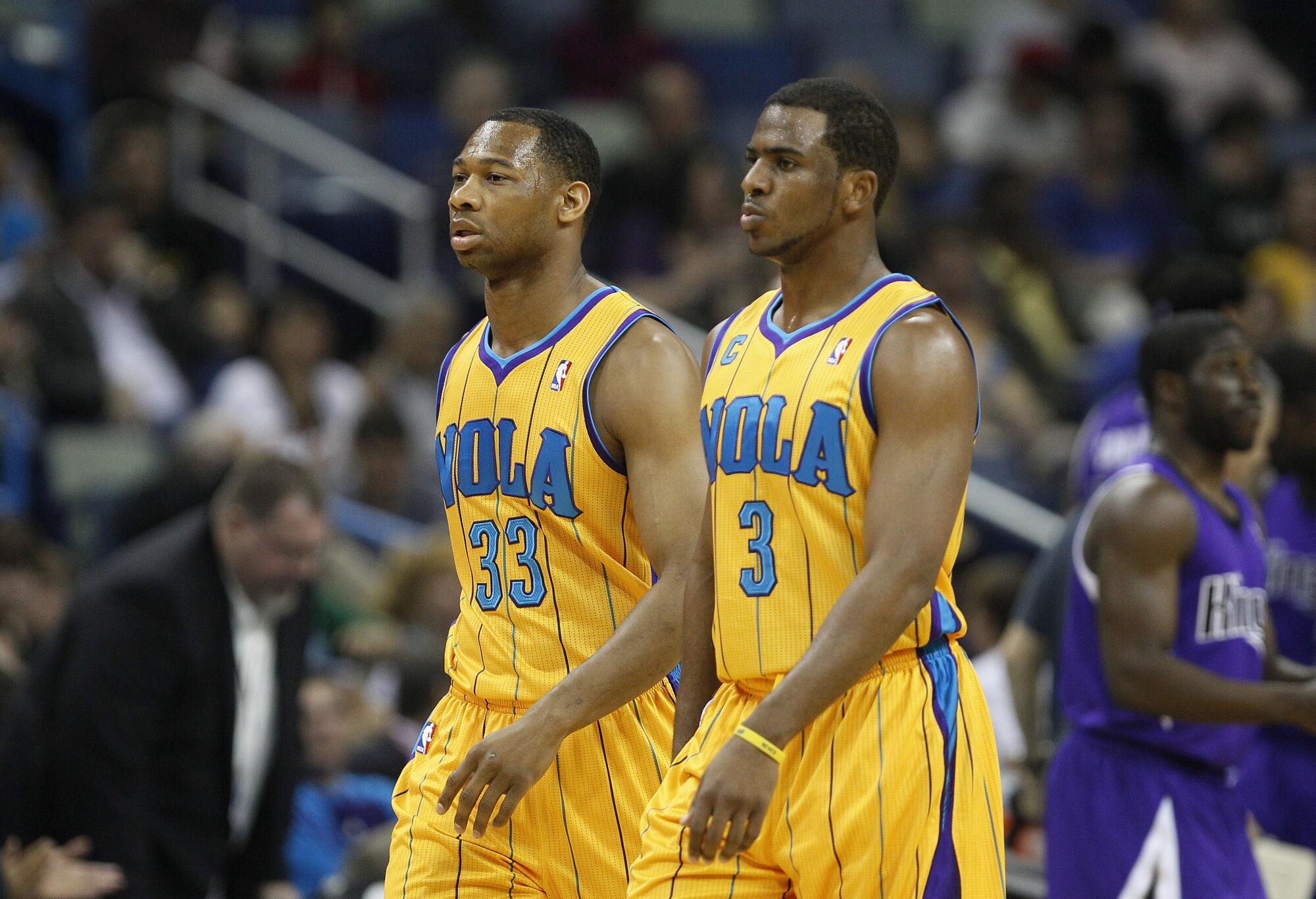
Part Two, The New Suitor: “I thought it was all gonna fall apart”
With the Lakers out the Clippers swooped in, following information relayed months earlier to the team’s front office — that Paul, while playing offseason pickup games in Los Angeles alongside some Clippers, had made it known he wanted to play there. On Dec. 11, the Times’ Broderick Turner reported the framework of a deal: center Chris Kaman, backup guard Eric Bledsoe, forward Al-Farouq Aminu and an unprotected 2012 draft pick. Eric Gordon no longer was part of the proposed package despite New Orleans’ interest in the guard.
Bledsoe: “A couple players knew they was getting traded, like Chris Kaman, he kind of knew.”
Person with knowledge of the Clippers’ front-office thinking at the time: “I just had the feeling that the sticking point was Eric Bledsoe. … I thought it was gonna fall apart.”
The next day, then-Clippers general manager Neil Olshey told reporters the deal was off, because “the cost was just way too high.” With the lockout-delayed season about to begin, Clippers players and coaches joined fans aboard a bus caravan on Dec. 14 to drum up interest around Los Angeles.
Jesse Beer, Clippers season-ticket holder for more than 30 years: “Eric [Gordon] was in the way back and I was across the aisle from Vinny Del Negro and a couple of the assistants. And I don’t think Twitter was huge 10 years ago, but it was relevant and a buddy of mine, Bill Simmons, was tweeting. He tweeted out, ‘There’s a buzz in the air that the Chris Paul trade is happening.’ And I showed that to [Ricky Chu, another season ticket-holder on the bus] and a couple other things came down after that, and I was freaking out. We both were.”
Bledsoe: “I just remember we were doing appearances. That’s when Twitter was big and I was getting a whole bunch of tweets about ‘Congratulations, you’re going to New Orleans’ and stuff. … I didn’t know how to feel, it was my first time being in that type of situation.”
Beer: “I looked at [Del Negro] and he just told me to be quiet. Because they hadn’t even told Eric. He wasn’t aware of anything. So we sort of got it before he got it. And I believe within three minutes [Gordon] answered his cell phone and he’s just sitting there and he looked, I don’t know, upset, frustrated, confused.”
The Clippers-Hornets trade was approved by the league and became official the following day: Paul to Los Angeles in exchange for Gordon, Kaman, Aminu and the first-round pick that later became Austin Rivers.
Jackson: “The attractiveness [of the Clippers’ offer] was it wasn’t as good a package that was originally agreed to, but they did get a first-round pick. … The [three-team] package they were going to get was too good. At the time, Kevin Martin was a really good player. Goran Dragic was a very promising player. Lamar Odom was a championship-level player and Luis Scola is a 15-to-20-year veteran in the NBA who was very productive at that point in his career. They were going to be good. And Monty Williams was the coach. So they were going to be good. Just not good enough.
“Given the NBA collective bargaining agreement, that is not a place you wanted to be at that time because as you may recall, being a mediocre team in the NBA under that collective bargaining agreement just meant you were resigned to mediocrity, purgatory.”
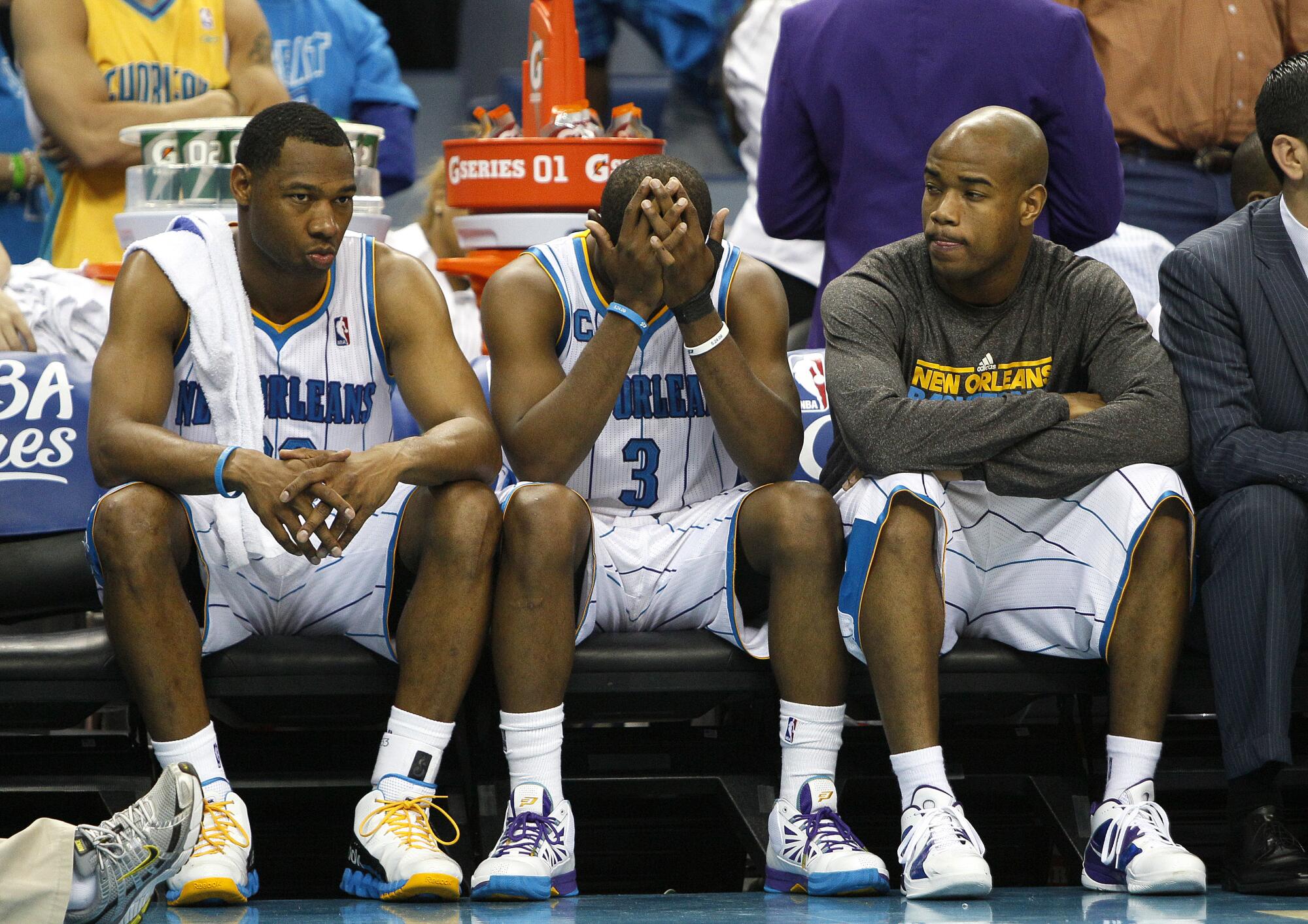
Green: [Paul] “was thrilled more than anything that it was behind him and he was in a good place, a place that he wanted to play and a good space mentally to continue his career. But he agreed, I agreed, it was a tough situation to go through.”
Jack: “I remember being relieved. You know, just relief for everybody involved.”
Person with knowledge of the Clippers’ front-office thinking: “I do remember feeling a sense of real euphoria, knowing just how good I felt Chris Paul was. We needed a guy like that who could come in and just bring that leadership and basketball IQ to the organization which, quite frankly, we never had at that level before. I mean, he’ll go down as one of, if not the greatest Clipper of all time, I believe.”
Part Three, Fallout: “It wasn’t fair to David”
Paul spent six seasons with the Clippers and amassed the most win-shares and assists in franchise history to go with five all-NBA selections and six all-defensive team honors. The Clippers own a 63.3% winning percentage in the 10-plus seasons since Paul joined them, the NBA’s third highest behind only Golden State and San Antonio. However, the Clippers never advanced beyond the postseason’s second round in his time with the franchise.
Paul George, Clippers forward, who grew up in Palmdale rooting for the franchise: “It was a moment where you felt some hope with the Clippers, with [Blake Griffin], [DeAndre Jordan], CP and then that was a good trio and then they slowly started adding weapons around them like Jamal [Crawford], [J.J.] Redick came, Paul Pierce came, Bled was here. It was like, damn, Clippers is like a force right now.”
Person with knowledge of the Clippers’ front-office thinking: “I don’t know if it would have turned the Lakers into a championship team, but that was the turning point in the Clippers’ history, I believe.”
Bledsoe: “It was a lot of energy around the building. When you got him it was like, now you got expectations. You’re heading in the right direction.”
Without Paul, the Lakers still needed a point guard. They acquired one the next summer in former most valuable player Steve Nash in a highly anticipated pairing with center Dwight Howard — another All-Star the Lakers pursued in December 2011 to no avail. Injuries limited Nash and Bryant to playing only 42 games together. The Lakers’ 44.1% winning percentage since 2011 ranks 21st in the NBA, yet the franchise won the 2020 championship behind LeBron James and a former star in New Orleans who had his eyes on L.A. eight years after Paul — Anthony Davis.
Jack: “To now go back and think like first of all the potential of what Kobe and Chris could have created, goodness — goodness gracious. That’s just enough to wonder on your own, like two stars of that magnitude crossing paths, what would that look like? Who knows?”
Stern in 2018 on nixing the Lakers trade: “I did it because I was protecting the then-Hornets. … To this day everyone always asks me, ‘Well why did you keep Chris Paul from going to the Lakers?’ I didn’t keep him. I didn’t approve the trade. No team sells or trades a future Hall of Famer without the owner signing off, and I was the owner’s rep.”
Jeanie Buss, Lakers president and governor: “I feel like our fans felt like, ‘The league just wants to punish the Lakers.’ Like, ‘The league is working against the Lakers from being successful.’ And that wasn’t the case at all. And it wasn’t David acting as commissioner. It was David acting as a person protecting the Hornets.
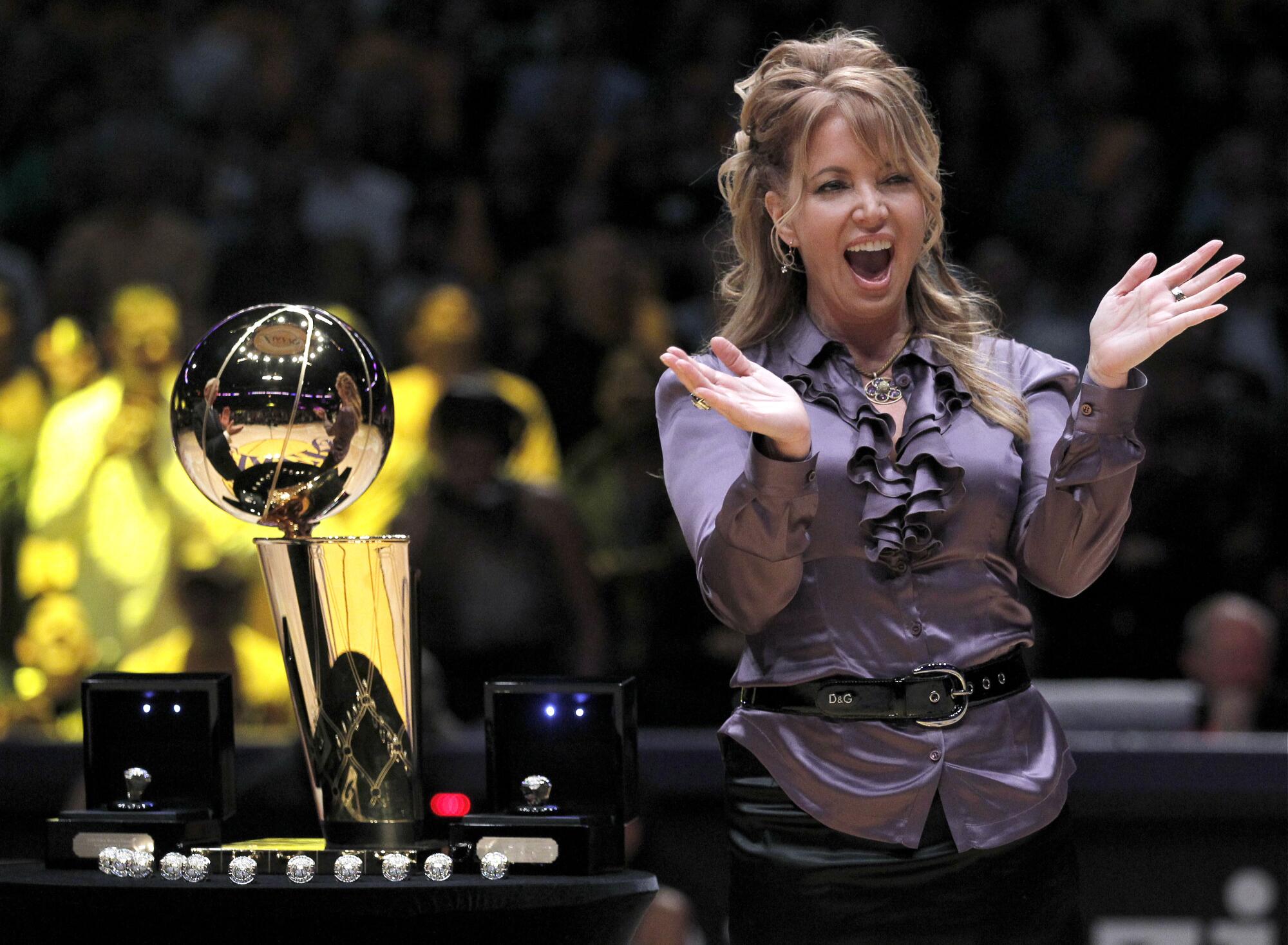
“What I want the fans to know, to come away with, is the league doesn’t try to keep us down. That was never David Stern’s intention in that and it wasn’t fair that David was booed when he came to L.A. after that. He didn’t deserve that. David was the greatest commissioner of all time for what he built and what he stood for in this league. I miss him every day.”
Stern died in January 2020. Paul, now 36, played in his first NBA Finals last season with Phoenix, where he was reunited with Williams, the Suns coach, and Jack, now an assistant. Green is in his first year coaching the New Orleans Pelicans. The NBA reached an agreement to sell the franchise to New Orleans Saints owner Tom Benson in April 2012 — four months after Paul was traded.
Jackson: “If we had continued to own the Hornets, situations like this and others would have come up so I think we were happy not to be in the ownership game. Not think — I know we were. And this deal had a lot to do with it.”
Paul to the Knuckleheads podcast: “I always say I played for the Lakers for a little bit. Like, for a couple of hours.”
More to Read
Go beyond the scoreboard
Get the latest on L.A.'s teams in the daily Sports Report newsletter.
You may occasionally receive promotional content from the Los Angeles Times.











